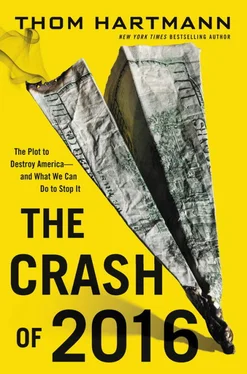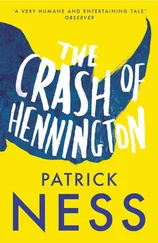The prominent Tea Party organization, the Tea Party Patriots, attributes the beginning of the Tea Party to a rant by CNBC talking head Rick Santelli in February 2009—less than a month after President Obama took office. [1]Santelli was reporting from the floor of the Chicago Stock Exchange when he went off on a program being floated by the Obama administration to help struggling homeowners during the height of the foreclosure crisis that was sweeping across the nation.
Santelli went unhinged while live on the air, yelling, “The government is promoting bad behavior… How about this president and new administration? Why don’t you put up a website to have people vote on the Internet as a referendum to see if we really want to subsidize the losers’ mortgages.”
By “losers,” Santelli was referring to struggling homeowners who had been hustled into buying adjustable-rate mortgages by predatory salesmen out to make a quick buck in the banking industry.
Never mind the program being proposed by the Obama administration to deal with that crisis was far weaker than the one passed through Congress by Franklin Roosevelt, which backstopped people’s mortgages to stop the train wreck of a foreclosure crisis during the Great Depression.
Santelli turned to traders standing nearby and asked, “This is America. How many of you people want to pay for your neighbor’s mortgage that has an extra bathroom and can’t pay their bills? Raise your hand. President Obama, are you listening?” 114
The Economic Royalists were listening. And there was already a movement afoot to exploit Santelli’s rant for their own gain. Santelli himself gave up this fact when he shamelessly plugged what was likely the first-of-its-kind Tea Party rally, saying, “We’re thinking of having a Chicago tea party in July. All you capitalists that want to show up to Lake Michigan, I’m gonna start organizing.”
While on the surface Santelli’s rant may have seemed like the kickoff of the Tea Party movement, a closer look at the facts shows that a “Tea Party” was already being organized even before President Obama took office.
A 2013 study 115published in the scientific journal Tobacco Control revealed that today’s incarnation of the Tea Party goes back a long way—well before the election of Barack Obama.
Talk of a new Tea Party to advance corporate interests in America began in the 1980s and 1990s, when tobacco companies invested heavily in building new broad alliances with other organizations in hopes of fighting back against the emerging antismoking agenda in Congress.
Taking the advice of the Powell Memo, written a decade earlier, tobacco companies such as R. J. Reynolds, Lorillard, and Philip Morris funneled millions of dollars into an organization called Citizens for a Sound Economy (CSE). One funder of CSE is one of the most prominent Royalists of today, David Koch.
The purpose of CSE was to build a coalition of tobacco companies and corporate polluters to oppose regulations on smoking and air pollutants being considered in Congress. It’s estimated that at least $5.3 million was funneled into CSE by Big Tobacco.
Then in 1993, a Philip Morris PR flack wrote a “Powell-esque” memo outlining a strategy of fighting any new taxes by joining up with other antitax groups to create a “New Boston Tea Party.”
The memo reads, “Grounded in the theme of ‘The New American Tax Revolution’ or ‘The New Boston Tea Party,’ the campaign activity should take the form of citizens representing the widest constituency base mobilized with signage and other attention-drawing accouterments such as lapel buttons, handouts, petitions and even costumes.” 116
Ultimately, the tobacco companies failed and were hit with a massive $200 billion settlement in 1998. But in 2002, David Koch’s CSE purchased a website domain name: USTeaParty.com. Eventually, plans for this Tea Party were put on hold. After all, a Republican Royalist, George W. Bush, was in the White House, and Royalists were in control of Congress, so there was no reason to cause any trouble.
Only after the Royalists crashed our economy, and were banished from Congress, would the so-called Tea Party be revived. And sure enough, it was revived by CSE. Only, by now, CSE had split into two Astroturf corporate-funded organizations: Americans for Prosperity and FreedomWorks. Unlike “grassroots,” Astroturf organizations are propped up by a wealthy elite and rely on corporate cash rather than genuine activism.
Few did more to put the Powell Memo into motion than the billionaire Koch brothers, David and Charles.
They run the massive transnational conglomerate known as Koch Industries, dealing in everything from petroleum refining and distribution, to chemical processing and ranching.
Koch Industries is the second largest privately held company in the United States, taking home nearly $100 billion in annual revenue. And the Koch brothers occupy spot 4 on the Forbes 400 Richest People in America list, each worth $31 billion. Together, they are wealthier than Warren Buffett, who is in spot 2 on the list.
They inherited Koch Industries from their father, Fred Koch, who in 1927 discovered a more efficient way of processing crude into gasoline, which he pitched to Joseph Stalin in the Soviet Union and made a fortune.
Despite his collaboration with the communists, Fred Koch was an unapologetic Economic Royalist. Long before Lewis Powell’s memo, Fred helped found the John Birch Society in 1958. It was a group of far-right, fierce anticommunists, who also worked against the civil rights movement in America. They subscribed to the radical economics of neoliberalism, which was still shut out of the mainstream political and economic debate at the time.
But Fred would instill in his sons, Charles and David, this same radical Royalist ideology that would soon gain favor around the world in the 1980s.
Writing in The New Yorker , Jane Mayer talks about the political influence on the Koch brothers, such as the John Birch Society to which they were exposed through their father.
“Members of the John Birch Society,” she writes, “developed an interest in a school of Austrian economists who promoted free-market ideals. Charles and David Koch were particularly influenced by the work of Friedrich von Hayek… [and his] belief in unfettered capitalism.”
She adds, “Charles and David also became devotees of a more radical thinker, Robert LeFevre, who favored the abolition of the state… LeFevre liked to say that ‘government is a disease masquerading as its own cure.’”
David Koch even ran for president in 1980 on the Libertarian ticket, but only received 1 percent of the vote. As Mayer writes, “The brothers realized that their brand of politics didn’t sell at the ballot box. Charles Koch became openly scornful of conventional politics. ‘It tends to be a nasty, corrupting business,’ he told a reporter at the time. ‘I’m interested in advancing libertarian ideas.’”
And they had a lot of money to do just that.
The Rise of the Kochtopus
When Lewis Powell told Eugene Syndor that the Chamber of Commerce needed to spend more money influencing politics, education, the media, and school curriculums, he might have been better off just addressing the letter to the Koch brothers.
At the onset of the Jimmy Carter presidency, in 1977, they bankrolled the CATO Institute, a think tank devoted to espousing Libertarian—or Royalist—ideology.
Brian Doherty, a senior editor at Reason magazine, interviewed the brothers multiple times. He quoted Charles describing the strategy behind their funding to “bring about social change.” It was, Charles said, a “vertically and horizontally integrated” endeavor “from idea creation to policy development to education to grassroots organizations to lobbying to litigation to political action.”
Читать дальше












